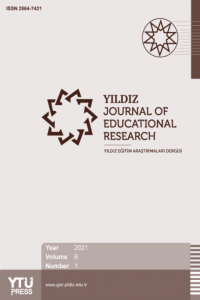Abstract
The aim of this research is to determine the level of the leadership of the education administrators according to teachers’ perceptions. In the research Quantitative Research Technique was used. The data were collected through the "Elementary School Principals’ Technology Leadership Role Scale” consisting of 29 items. The scale had four sub-dimensions such as "human centrism, vision, communication and cooperation and support’’. The effects of teachers’ opinions are examined through the variebles of 'gender, seniority, educational status and school population. The research data were obtained from 445 teachers who were selected from official primary and secondary schools in the province of Kecioren in the province of Ankara by using appropriate sampling method. In order to analyze data, arithmetic mean, standard deviation, t-test, one way ANOVA and Pearson Correlation tests were used. The findings of the research show that teachers find the administrators’ technology leadership competence "Partly adequate" (x ̅=3,25). The highest level of behavior that school administrators have is "Human Centeredness (x ̅ = 3,31)"; and behaviors at the lowest level are the behaviors of "Communication and Cooperation (x ̅ = 3.18)" dimension. It was determined that the education status variable was a significant factor in the teachers' perceptions in all sub-dimensions. It was determined that the graduate degree of teachers was found to be more efficient in their technology leadership. It was determined that teacher opinions about administrator change with the same level of their graduation degrees. While the student population variable has no effect on human centrality and vision sub-dimensions, there has been significant factor on the communication and cooperation and support sub-dimensions. The study area of the teachers, the gender and the seniority variables were found to be not a significant factor in the teachers' opinions in all the sub-dimensions. When technology is considered a priority, it is not enough for school administrators to demonstrate some of technology leadership behaviors, they can improve themselves by identifying their incompleteness.
References
- The article references can be accessed from the .pdf file.
Details
| Primary Language | English |
|---|---|
| Subjects | Behaviour-Personality Assessment in Psychology |
| Journal Section | Research Articles |
| Authors | |
| Publication Date | June 20, 2019 |
| Published in Issue | Year 2019 Volume: 4 Issue: 1 |


